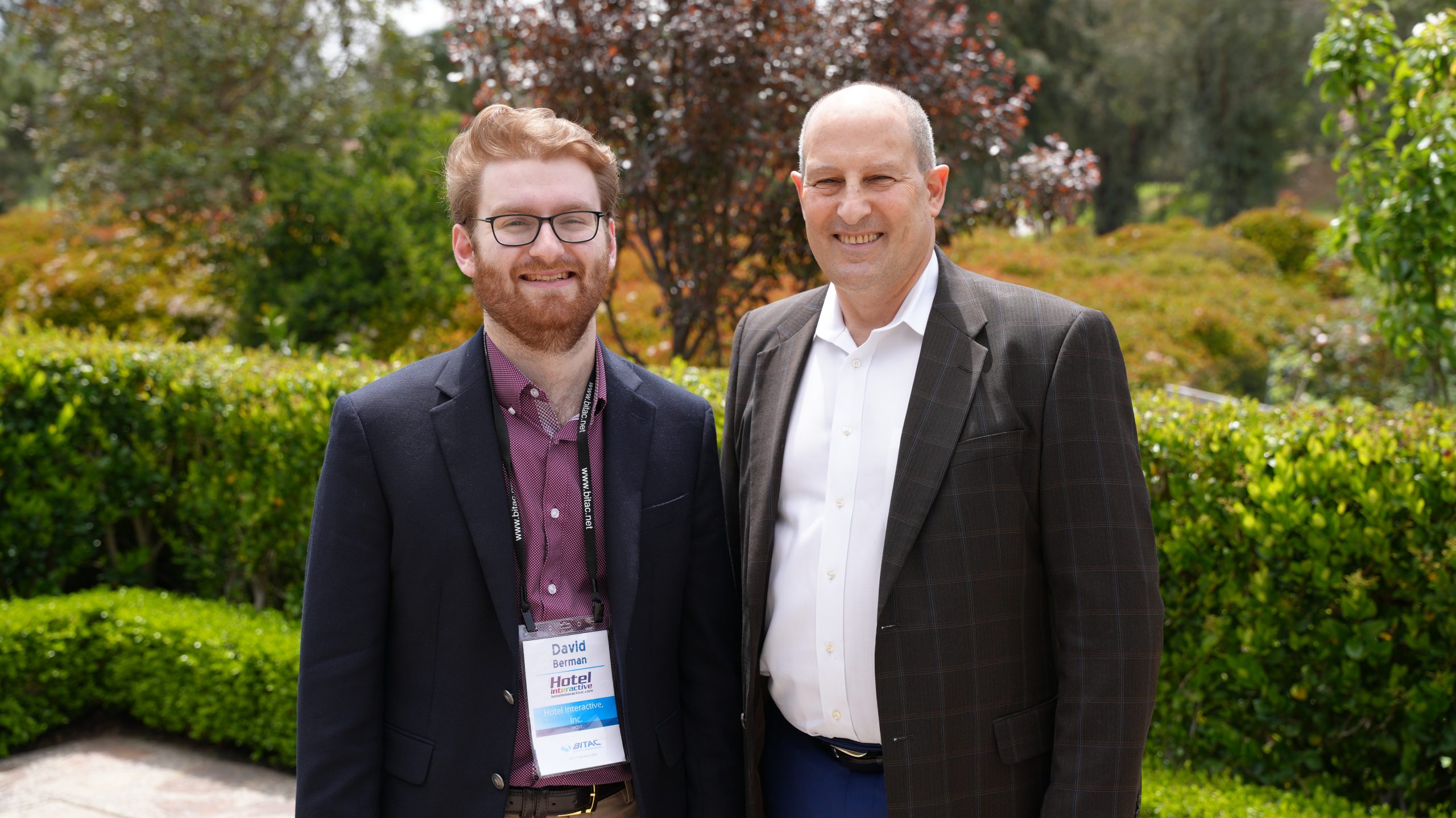Exclusive: One-on-One Interview with AHLA President and CEO Chip Rogers
By David Berman | February 13, 2023
It’s no secret that the COVID-19 pandemic has touched every corner of the world, impacting industries of all shapes and sizes. The hospitality industry is no different, as the instant shutdowns of travel and social gatherings in March 2020 hit hoteliers hard.
As we approach 3 years since the onset of the pandemic, AHLA President and CEO Chip Rogers sat down with Hotel Interactive to discuss the impact of the pandemic, both then and now, the direction of the hotel industry in 2023 and beyond, and other AHLA initiatives.
This conversation has been lightly edited for length and clarity.
Hotel Interactive: You began your current position in January 2019, so we just passed four years of you in this role. So if you could just start off by talking broadly about your experience so far — some highlights, some challenges and reflect on how the last four years have been.
Chip Rogers: Well, I guess the most accurate description would be a roller coaster. You know, first, let me just say, this is the best industry in the American economy — maybe the world. Getting to work in the hotel industry, which is a central focal point of the usually very positive experiences that people have in life, it’s something that you can go home every night and realize that you’re making a positive difference.
So I came in in 2019 here at AHLA, and that was the year that I guess, up to that point, was the best year ever for hotels. We didn’t know at the time, but we were at the end of a nine year run of continuous improvements in margins and RevPAR for hotels so things were wonderful in 2019. Then you hit early 2020 and you have the biggest drop that the industry, and I would almost guess almost any other industry, had ever experienced. You went from historic highs to the lowest levels the industry has ever seen. You think about some of the great, or the terrible I should say, economic things that have happened in our nation over its history; you can go back to even the Great Depression, the economic downturn that happened in 2009-2010 and those things didn’t even compare to what we experienced at the beginning of the pandemic. We were at the highest highs, then went to the lowest lows.
We’re in this slow climb out of it, and now we’re at the point here at the start of 2023, we’re kind of back from a revenue standpoint. We’re back to where we started from in 2019. Of course, you’ve got to factor in inflation and things like that, and the industry looks different. But if you’re trying to pinpoint a place where you can say you’ve recovered, it’s probably around now depending on where you are in the industry.
HI: Another time based question — we’re coming up on three years now since the pandemic really started to take hold in the United States and around the world. And so if you could take me back to those moments where you really started to realize that this is a major, major problem for the industry and just all the feelings that came with that.
Rogers: Well, you knew it was a problem when it first hit in February/March of 2020. But the question at that time was, how long does this last? And if you recall, there were these programs that were being promoted by the government – 15 days to stop the spread and things like that. And so I think, February, March, April, you’re probably looking at, “okay, we’re taking a hit, and it’s a big hit, but this is going to pass rather quickly.” And then you get into May and June and July and you realize that people aren’t traveling. The summer travel season is going by and people just aren’t out there — in most places. It wasn’t uniform. I mean, Florida bounced back almost immediately. But it was really the unknown. And that was the thing that I think is the biggest challenge for anyone running a business. Tell me what tomorrow looks like, and I can plan for it. Tell me what five years looks like and I can plan for that. But we were faced in March, April, May, and certainly once you got into June and July, with an industry where we were saying we’re not sure what tomorrow looks like.
You still had international travel bans. You still had businesses in America preventing their employees from traveling. The American people by the end of the summer of 2020, a good portion of which started taking some trips, but we were so far away from where we had been. There was just no true light at the end of the tunnel. That didn’t happen, really, until the vaccines were announced. With the announcement of some of the vaccines, people began to have confidence that they could travel safely.
HI: Next, if you could just take me through how AHLA has tried to guide the industry through the pandemic, talking a little bit about you and your team’s general philosophy and just how that shifted over time as we’ve hit different points in the pandemic.
Rogers: When things are normal, and we’re getting close to that, what we say is we protect and promote the industry. And so we’re always out trying to make sure that lawmakers understand what our industry does; the incredible good that we do in local communities; the massive economic impact, not just in the tens of billions and hundreds of billions of dollars in taxes we pay to state, local and federal governments, but also the people that work in our industry, the positive impact that they have, the economic activity that they create. So that’s on the promoting of the industry side, and then of course the protecting is, you know, it’s our job to make sure bad policy is not passed that hurts the hotel industry and ultimately hurts people that work in the industry. And so, that’s what we do in normal times.
During the pandemic, it wasn’t so much about promoting the industry. It was about how do we survive, and so our focus really shifted almost exclusively to the federal government because most state governments shut down for a period of a year, year and a half. We were working literally every single day with members of Congress and the administration to find ways to create economic lifelines for hoteliers. So this wasn’t a matter of are things going to happen that hurt the bottom line. This was really a matter of will the government take action that will prevent tens of thousands of hotels from actually going out of business for good, and so it was certainly a calling of the highest order for us and what we do.
It certainly allowed us to focus on what mattered most, and that was survivability. And I’m happy to report a few years later, we did a lot of good. Now, are there hotels that closed down and never reopened? Yeah, but (it was) so many fewer than we had originally anticipated. Just in federal government assistance alone, we know it was in excess of $50 billion that came to the hotel industry. I feel like ourselves, our members, and our partners did a lot of great work that can help a lot of hotels survive.
HI: On a macro level, what aspects of the industry do you feel have been the most affected in the last few years?
Rogers: Well, as I mentioned a moment ago, the industry coming out of this, it looks different. The customers are different. The travel patterns are different. And so depending on what type of hotel you are and where you’re located, you’re probably looking at a recovery that is unique to that geographical location, that type of hotel.
So for example, if you take a look at Miami, yeah, they had a downturn immediately, but they were certainly in full recovery mode by the summer of 2020. Take a look at San Francisco, Seattle and Washington, D.C. These three markets still haven’t recovered to this day. I mean, I’m sitting here in Washington, D.C., and the hotel industry here is not what it was in 2019. If you have a hotel that focuses on outdoor activities, any type of hotel near the beach or the mountains or a resort hotel, if you have an extended stay hotel, you probably recovered very quickly and most certainly are doing much better than you were in 2019. Meanwhile, if you have a hotel that’s tied to a large convention center in an urban downtown area, you most assuredly are not doing as well as you did back in 2019. So it was a regional recovery. It was a different type of traveler recovery and even to this day, you know, we see the leisure traveler really dominating what happens with hotels and the business travelers slowly but surely coming back.
HI: Two questions jumping off of that, and I’ll just start with the first one. You’ve said that recovery for the hotel industry has been very regional, but overall, how would you categorize this time that we’re in now? Is this still a period of recovery, or is it a period of growth?
Rogers: I believe it’s going to be a period of growth. Now, we have to think about a couple of headwinds, theoretical headwinds. One, is there a lodging/travel recession? The reason I put that descriptor on it is because, however you measure the American economy, some would say we’re already in the middle of a recession because we had two consecutive quarters of contraction, but we’ve not seen that yet in the travel sector of the economy. So even if we go through a recession, can we escape it without the travel sector being hit?
Second, we have to think about the leisure traveler, and I think most people would admit, because there was such enormous pent-up demand during those two years where most people didn’t travel, is the spike that we’re seeing over the last year and a half sustainable? I would think most people would say probably not, but there’s also been a shift in the way that people look at how they spend money and people are willing to spend on experiences over buying products. And so if the consumer has shifted, and we saw a shift actually beginning before the pandemic, the way that they look at investing in their life, then maybe we can sustain this leisure travel.
The third thing we need to look at is, this work from anywhere (trend), is that permanent, and what does that look like? Because the hotel industry is benefiting from that in that people are now tacking on extra days on the front or back of their business trip to turn that into a leisure trip.
And then I think the fourth thing, which would be the most concerning thing for us, particularly near urban city centers where the traditional five day workweek has been largely replaced by a three day week in the office: How does that impact those urban city centers? And so you know, there are some things coming out of the pandemic that I think serve us well. There are some things coming out of the pandemic that I’m concerned about. And then of course, overlaying all of this is will we have a recession, and if so, how long does that last?
HI: The second question based off this idea of markets like Miami having recovered almost immediately, and markets like some on the West Coast still struggling compared to that 2019 point: How does that guide AHLA goals and initiatives where we’re in this period where some markets are doing just fine and some are really struggling still?
Rogers: Well, look, it’s not a bad thing that we can point to examples of where things are working well. If you’re a policymaker, and if you can set aside partisanship and everything else and say, “Okay, what is Miami doing? What did Miami do, or Florida in a larger sense, that put them in a position to recover so quickly and maintain that recovery where San Francisco or Seattle has not been able to?” Now there are things out of their control. San Francisco and Seattle are highly dependent on Asian travel. No matter what you do as a policymaker, domestically, your ability to attract travelers from an area of the world that has been largely shut down, and in many places still remain shut down, you just have such limited control over that.
But we can take best practices from places that have rebounded quite well and say, look, if you want your hotel, your hospitality, your tourism economy and your local jurisdiction to recover and sustain that recovery, you might want to try some of these things. And so it’s great to have those examples. You know, again, Miami, Tampa, Phoenix, these are places they’re doing better than they’ve ever done before, and that’s a good thing. We want to point to those successes.
HI: You touched on this a little bit when talking about some of the industry headwinds, but I’m curious to hear some more of your thoughts on where the industry is heading. What direction is the industry heading three years out from the pandemic, and how can AHLA help guide that direction?
Rogers: Well, I think we’re going to be in a good position because the inflation factors that hurt so much of our economy are not felt in the same way by the hotel industry, because we’re able to reprice every day, right? Commercial real estate can’t do that. They have long term contracts. Residential real estate can’t do that. But for hotels, being able to reprice every day means that we’re going to be able to capture that increase in revenue to cover, by the way, increasing costs.
But the industry went through a time where we were required to prioritize survivability, and so a lot of good comes out of that. You can look back and say, “Okay, now we figured out the things we absolutely must do to survive, and how do we build on that?” Maybe we got rid of some of the things that we didn’t need to have. Also, technology is playing such a critical role in creating efficiencies in the industry, because you had to have it during the pandemic when you’ve lost so much of your labor.
Now, those are all the positive things. Some of the things that we are very concerned about: number one, the workforce. The American labor participation rate is at a historical low right now or hovering near it. There just aren’t as many people working in the U.S. as open jobs, and that has happened rarely in our country’s history. But now we’ve had that for a very long extended period of time, which makes you think that it may be structural. How are we going to deal with that? And then organized labor, particularly in the hospitality space, has become much more aggressive, and advocating for policies that don’t just shave off points on the margins for hotels, don’t just limit hotels ability to hire more people, but in some cases, those policies can be so damaging, they can literally put hotels out of business. So we have concerns about hyper activity around organized labor and the policies that they are promoting that are meant to be very, very destructive to the industry.
HI: My next question actually is about labor shortages that the industry is seeing. That’s something we’ve heard from many people in the industry that we’ve been talking to over the last month or so that that’s a major concern. So I’m curious to hear your thoughts on solutions to that problem specifically in the hospitality industry.
Rogers: There’s two ways to look at a challenge of not having enough workers. First, you assess what the available work pool is today. And if you look at the United States and recognize what we’ve done on workforce participation rates in the last 20 years, when you look at the birth rate, look at when people are entering the workforce, when they’re leaving the workforce, there are some very concerning signs that show up. If you’re fighting over a pie that is either stagnant or shrinking, you have to figure out ways, especially at a time like this when demand is high across all industries, of being able to convince people to move into your industry.
Now, we’ve responded with the highest wage increases probably in the history of the industry; 60% faster than the national economy. I mean, right now the bottom line is this — wages are higher, benefits are better, opportunity is stronger than they’ve ever been in the hotel industry. And so when we’re recruiting people to come into our industry, what we have to offer is better than it’s ever been.
So that’s side one of the equation. Side two, and what is the long term recipe for success, is expanding the workforce. So how do you expand the workforce in the United States? Well, you can do one of two things, or hopefully both. One, you can expand the guest worker program that has been successful, but it is highly restricted by federal law. If we can simply expand that guest worker program to address both the needs and the supply of guest workers who want to come to the United States, that can be a significant help. And then number two, how do we have an immigration system that actually works, that makes sure that our border is secure, that the people coming into the United States, we know who they are, we know why they’re coming here, and then making sure we’re let allowing enough people into the United States to fill the economic needs of our nation. You see those numbers, month after month after month, the enormous gap between the number of jobs available and the number of available people to work. That gap is not shrinking. It has maintained that size. It’s got to be filled somehow, and it needs to be filled soon.
HI: Finally, a bit of a pivot here to the AHLA Foundation. I wanted to talk about the Foundation’s efforts to support survivors of human trafficking, specifically raising $2.5 million in the last year. Talk a little bit about those efforts and what they mean to you.
Rogers: Well, you know, I guess one of the greatest lessons you can ever learn in life is that you’ll ultimately do well by doing good. And we in the hotel industry a few years ago made a monumental decision across the board, owners, brands, everybody that touches our industry, to be very vocal in our efforts to stop human trafficking, to shine a bright light on a terrible crime. We have been highly successful in doing that. We have this goal and that is through our foundation to make sure that every hotel employee in America is trained to see the signs of human trafficking, to understand what to do with that information when you see the signs.
We have heard case after case after case of people that have been saved from being trafficked, because there were hotel employees who took the training. We’re having hundreds of thousands of people just in the last year that have been trained. And so we’ll continue to do that effort. But we also know that no matter how good we are at training people, no matter how vigilant we are in attempting to do everything in our power to stop human trafficking, there will still be survivors. And what do we do in those situations? Well, it’s incumbent on us, again, following that policy of if you do good you’ll do well, to take care of the people who have become survivors of human trafficking. And so to date, in less than a year, we’ve raised $2.5 million dollars. Our goal is by the end of this year to hopefully get to $10 million. That’ll put us in a very special place. I’m not aware of any other industry that’s been able to do something like this. Then, we’ll take those resources and help the people who deserve our help. And so we’re proud of the effort we’re putting forth, but more importantly than just the messaging, it’s how we are positively impacting the lives of people who have been so damaged by this crime.






Get involved!
Comments